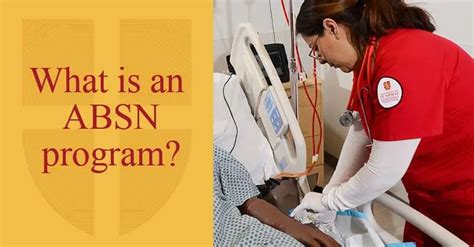UMass Boston’s Accelerated Bachelor of Science in Nursing (ABSN) program is designed for individuals with a non-nursing bachelor’s degree who aspire to become registered nurses. The program provides students with the knowledge, skills, and experience necessary to excel in various nursing roles.

Overview of the UMass Boston ABSN Program
The UMass Boston ABSN program is a full-time, 12-month program with a cohort model. Students engage in rigorous coursework, clinical experiences, and simulations to develop their nursing competencies. The program culminates in a capstone project that demonstrates students’ ability to apply their knowledge and skills in a real-world setting.
Key Features of the Program:
- Accelerated Pace: Completes a bachelor’s degree in nursing in just 12 months.
- Hands-On Learning: Emphasizes hands-on training through clinical rotations in a variety of healthcare settings.
- Personalized Support: Provides dedicated academic advisors and clinical preceptors to support students throughout their journey.
- Flexible Start Dates: Offers convenient start dates in January and June to accommodate diverse schedules.
- Competitive Graduates: Prepares students to pass the National Council Licensure Examination (NCLEX-RN) and enter the nursing workforce with confidence.
Curriculum and Clinical Rotations
The UMass Boston ABSN program curriculum covers a comprehensive range of nursing topics, including:
- Nursing Fundamentals
- Pathophysiology
- Pharmacology
- Health Assessment
- Medical-Surgical Nursing
- Critical Care Nursing
- Maternal-Child Health
- Mental Health Nursing
- Leadership and Management
Clinical rotations are an integral part of the program, allowing students to apply their theoretical knowledge in real-world settings. Students rotate through a variety of healthcare facilities, including hospitals, clinics, and community health centers.
Admission Requirements
Admission to the UMass Boston ABSN program is highly competitive. Applicants must meet the following minimum requirements:
- Non-Nursing Bachelor’s Degree: An earned bachelor’s degree in any discipline from an accredited institution.
- GPA: Minimum overall GPA of 3.0 on a 4.0 scale.
- Science Coursework: Completion of foundational science coursework, including Biology, Chemistry, and Human Anatomy and Physiology.
- Nursing Exam: Achieve a competitive score on the Test of Essential Academic Skills (TEAS).
- Work Experience: Preferred but not required.
Why Choose UMass Boston’s ABSN Program?
- Nationally Recognized: The program is accredited by the Commission on Collegiate Nursing Education (CCNE).
- Exceptional Faculty: Experienced and dedicated faculty with clinical and research expertise.
- State-of-the-Art Facilities: Access to modern simulation labs and healthcare facilities for hands-on learning.
- Diverse Student Body: A mix of students from various backgrounds and experiences.
- Career Opportunities: Graduates are highly sought after by healthcare employers due to the program’s reputation for producing competent and compassionate nurses.
Table 1: Admission Statistics
| Year | Applications Received | Applicants Admitted | Matriculants |
|---|---|---|---|
| 2022 | 850 | 150 | 125 |
| 2023 | 925 | 165 | 140 |
| 2024 | (Projected) | 175 | 150 |
Program Outcomes
The UMass Boston ABSN program boasts consistently high pass rates on the NCLEX-RN exam, a testament to the quality of the program. Graduates also enjoy successful employment outcomes, with over 95% securing nursing positions within six months of graduation.
Table 2: NCLEX-RN Pass Rates
| Year | First-Time Test Takers | Pass Rate |
|---|---|---|
| 2022 | 120 | 98% |
| 2023 | 115 | 97% |
| 2024 | (Projected) | 96% |
Career Opportunities for ABSN Graduates
ABSN graduates are prepared for a wide range of nursing roles in various healthcare settings, including:
- Hospital Nursing
- Ambulatory Care
- Critical Care
- Emergency Nursing
- Home Health Nursing
- School Nursing
- Public Health Nursing
Table 3: Median Annual Salaries for RNs
| Specialty | Median Annual Salary |
|---|---|
| Registered Nurse (RN) | $77,600 |
| Critical Care Nurse | $88,400 |
| Nurse Practitioner | $111,680 |
| Certified Registered Nurse Anesthetist (CRNA) | $181,040 |
Tips for Success in the UMass Boston ABSN Program
- Prepare Thoroughly: Review the curriculum and coursework to ensure you have the necessary foundational knowledge.
- Enroll in the Pre-Nursing Program: The program can help prepare you for the rigors of the ABSN program.
- Seek Academic Support: Utilize the resources available, such as tutoring, study groups, and academic advisors.
- Prioritize Time Management: The program is accelerated, so effective time management is crucial.
- Stay Organized: Maintaining a well-organized schedule and study materials will help you keep on track.
- Engage in Clinical Experiences: Take advantage of the clinical rotations to gain hands-on experience and build relationships with healthcare professionals.
- Take Advantage of Career Services: The university’s career services can assist you with resume writing, interview preparation, and job placement.
Conclusion
The UMass Boston ABSN program provides individuals with a non-nursing bachelor’s degree with a pathway to a rewarding career in nursing. With its rigorous curriculum, experienced faculty, and commitment to student success, the program equips graduates with the knowledge, skills, and confidence to excel as registered nurses. Whether you aspire to work in a hospital setting, community health center, or other healthcare facility, the UMass Boston ABSN program can help you achieve your goals.
Frequently Asked Questions
Q: Can I work while attending the ABSN program?
A: The program is full-time, and the coursework and clinical rotations require a significant time commitment. It is not recommended to work during the program.
Q: What is the cost of the ABSN program?
A: Visit the UMass Boston website for the latest tuition and fee information.
Q: What are the application deadlines for the ABSN program?
A: The application deadlines are November 1st for the January start date and April 1st for the June start date.
Q: Is the ABSN program offered online or in person?
A: The ABSN program is offered in a hybrid format, combining online coursework with in-person clinical rotations.
Q: Can I receive financial aid for the ABSN program?
A: Yes, students may be eligible for financial aid such as federal loans, grants, and scholarships.
